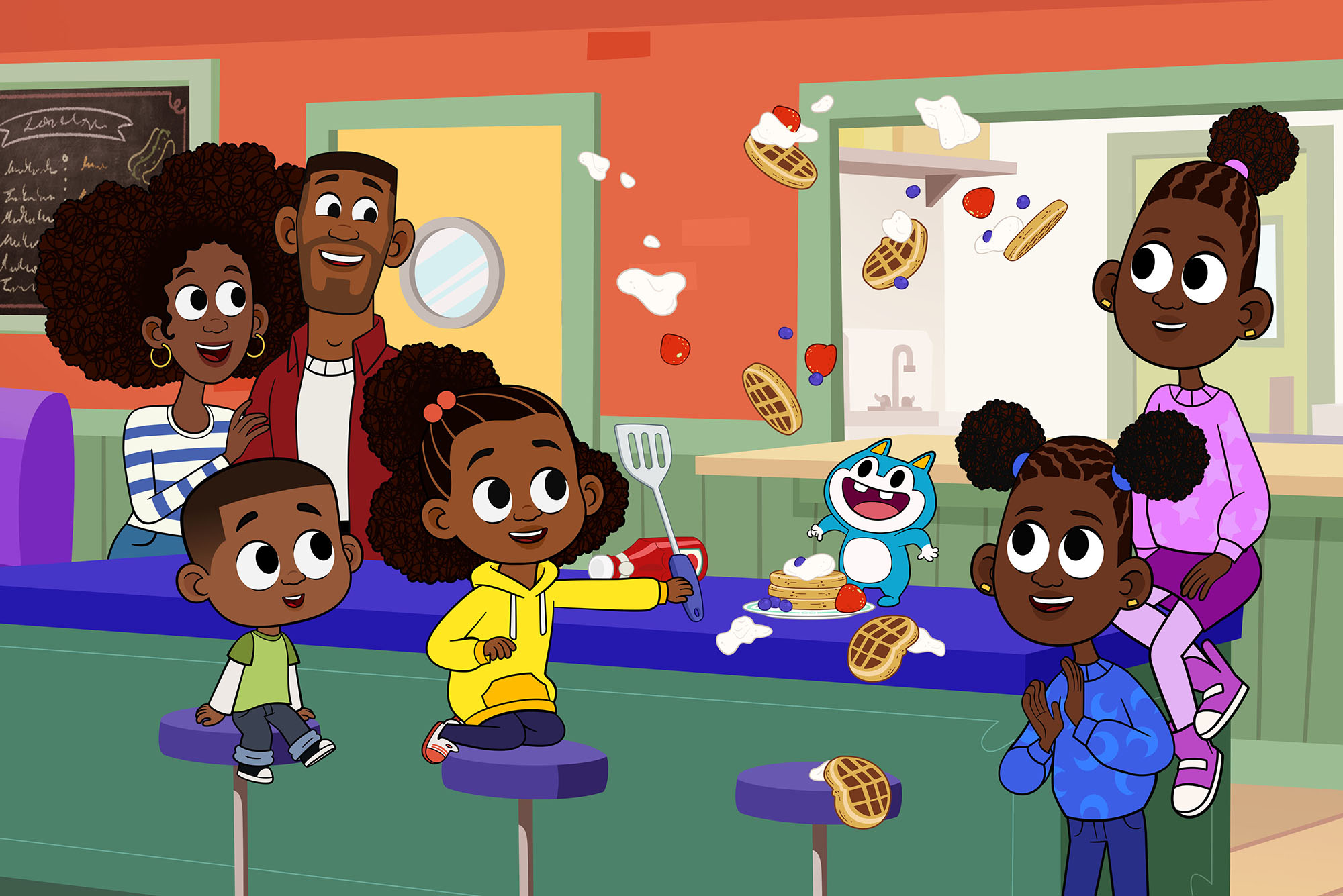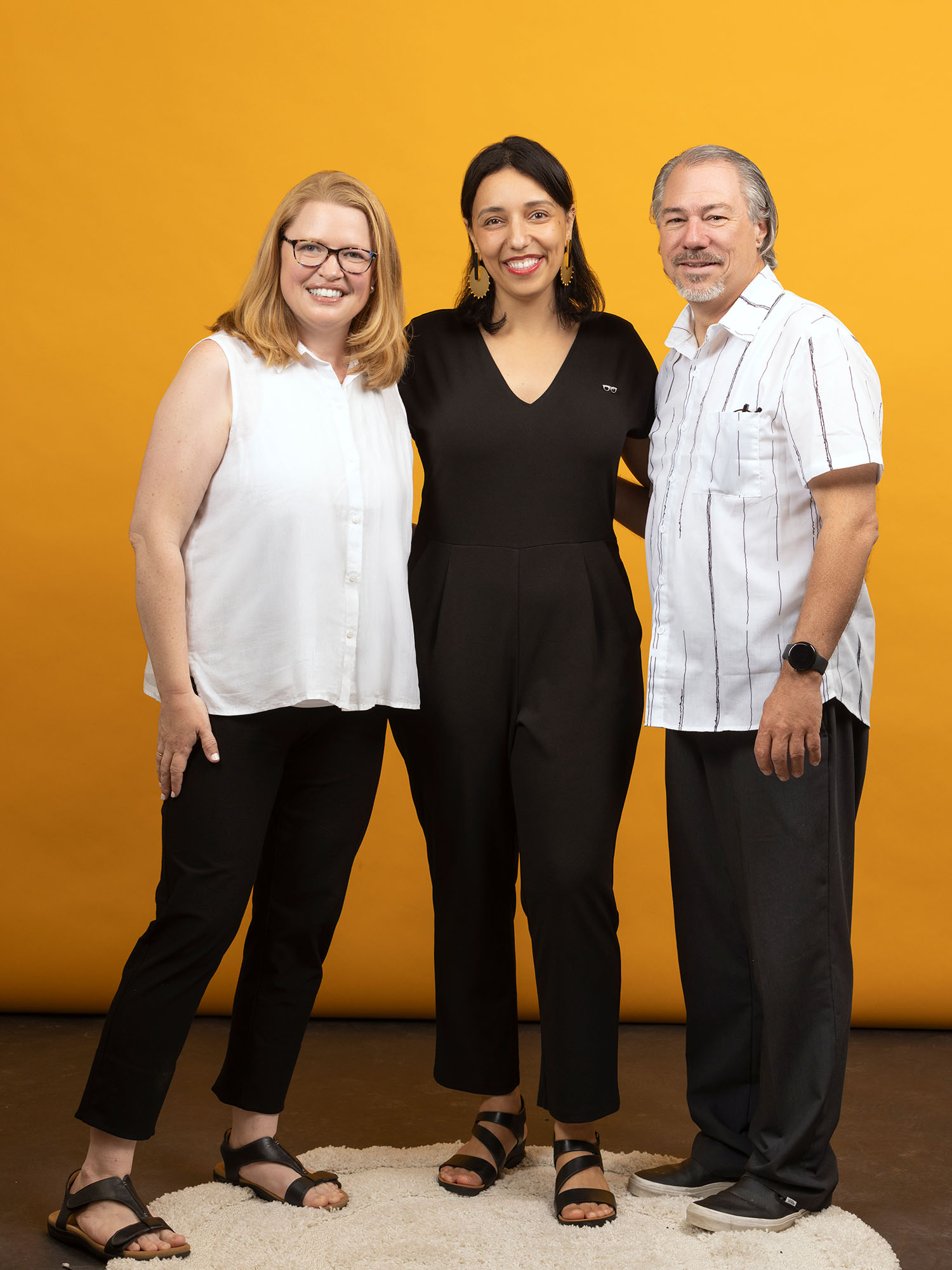Learning Through Screen Time
Consultants for PBS KIDS programming—two Wheelock faculty members and an alum—explain why informal education is more important than ever

From left, PBS KIDS consultants Deborah Farmer Kris (Wheelock’98, CAS’98), Scott Solberg (CAS’26), and Nermeen Dashoush, with merchandise and characters from the shows Lyla in the Loop and Carl the Collector. Photo by Michael D. Spencer
Learning Through Screen Time
Consultants for PBS KIDS programming—two Wheelock faculty members and an alum—explain why informal education is more important than ever
In one episode of Lyla in the Loop, titular character Lyla learns a handful of increasingly complicated magic tricks from her elderly neighbor, Miss Emmaline.
Back home in her room, Lyla, accompanied by her sidekick, Stu, tries to figure out how Miss Emmaline made her feet “levitate” behind a blanket. Keeping the key principles of magic tricks in mind—sleight of hand and misdirection—Lyla methodically talks through the possible steps. Eventually, the seven-year-old cracks it: if you rubber band your shoes together, you can lift just one foot off the ground, making it look like both feet are floating. Later, Lyla hosts a magic show for her family and neighbors, wowing them with her newfound talent.
The episode is just one example of the type of systematic instruction the PBS KIDS show hopes to impart to its young viewers.
“The goal of the show is to teach computational thinking skills, which are problem-solving skills that are foundational to computer science,” says lead Lyla advisor Nermeen Dashoush, a clinical associate professor of early childhood at Boston University’s Wheelock College of Education & Human Development.
Of course, she adds, Lyla isn’t using words like “algorithmic thinking” or “machine learning.” Rather, the series aims to show viewers—who are typically six to eight years old—how they’re already engaging in computational thinking. “Thinking about algorithms and coding, it’s all about step-by-step, specific instructions,” Dashoush says. “Examples of how we show that are [steps for] brushing your teeth, or the order in which Lyla styles her curly hair. That makes these concepts relatable.”
Lyla owes much to Wheelock faculty.
PBS KIDS employs childhood consultants for all of its programming. In 2020, the network won a Ready to Learn grant from the US Department of Education to create programming focused on career development in early childhood. It promptly brought on V. Scott Solberg, a Wheelock professor of psychology and applied human development. His charge? Create an evidence-based framework for building career skills into PBS KIDS content. (One key: show characters engaging in career-oriented concepts, such as marketing, financial planning, and lifelong learning.) The STEM-focused Lyla, one of several efforts to result from the grant, debuted in early 2024.
The animated series follows Jamaican American Lyla Loops and her family as they overcome challenges in their daily lives with critical thinking and logic. They’re aided by Stu, a goofy, catlike creature with generative capabilities who responds to specific prompts from Lyla and her siblings. (Stu is “analogous to an AI agent,” Dashoush explains.)

Solberg provides occasional input on Lyla scripts. His focus is signing off on content for What Can You Become?—funded by the same federal grant—a series of shorts on PBS KIDS in which adults tell interested kids all about their jobs.
Early on, PBS KIDS knew Lyla needed an early childhood specialist. That’s how Dashoush, a longtime expert in children’s media and early STEM education, joined the team. As lead adviser, she oversees every script, from brainstorming to final draft. Her job is to ensure that all episodes incorporate PBS KIDS’ learning framework and the show’s educational goals. She also advises on character design, so that Lyla, her family, and friends reflect a variety of PBS viewers. (Lyla features many characters of color.) Finally, Dashoush helps oversee the Lyla “ecosystem”: the companion games and resources, as well as printable educational materials available on PBS KIDS websites.
Both What Can You Become? and Lyla are meant to get the gears turning in the minds of young viewers, Solberg and Dashoush say—especially those who might not otherwise see themselves in certain career fields.
“They’re designed for very young children to imagine themselves in these [career] spaces,” Solberg says. “Our research shows that if youth of color, low-income youth, or youth with disabilities don’t have role models that are like them in those spaces, then they never develop a sense of belonging in them.”
The “informal space”—the nonacademic learning setting—that PBS KIDS offers is critical, Solberg adds. “That gives us so much more creative flexibility, as well as a relational environment that helps us bring families into the conversation,” he says. “One thing the network is phenomenal at is providing families with resources across different shows [and companion materials].”
It might seem too early to introduce career concepts to children so young, Dashoush says. But that’s the point. “We know that these are the foundational years in which kids form their STEM identity—‘Am I someone who participates in science?’—and their ideas of who practices science,” she says.
She’s proof of that. “I myself was a PBS kid,” says Dashoush, a native Arabic speaker. Thanks to shows such as Sesame Street and Mister Rogers’ Neighborhood, “I really got into science, and I actually learned English from watching these shows. We know that children’s media plays a pivotal role in providing access to education for diverse learners.”
Carl the Collector and social-emotional learning
Lyla isn’t the only PBS KIDS show with a Wheelock connection.
Deborah Farmer Kris (Wheelock’98, CAS’98), an author and a child development expert, has worked with PBS KIDS for years, writing parenting columns and advising on various PBS content. These days, she’s an expert adviser on Carl the Collector, an animated series with a neurodivergent lead.
Carl is a young autistic racoon who loves collecting objects and fun facts. He lives in Fuzzytown with his friends, who include autistic fox Lotta, identical rabbit twins Arugula and Nico, empathetic beaver Sheldon, and hyperactive squirrel Forrest. The series follows the group as they work together to solve problems and navigate each other’s differences.

Carl is the first autistic lead character in a PBS KIDS show. Lotta represents how girls on the spectrum can often present, which is different from boys. But neurodivergence isn’t the only point of the show, Kris says.
“We’re just trying to authentically show a dynamic where this friend group is filled with very different kids who love each other and care about each other,” she says. “I really love that Carl is often able to use his experiences to help his friends,” and vice versa. “You see this really symbiotic relationship, where the friends are able to help each other figure out what to do in new situations, based on their own strengths.”
In one episode, Carl desperately needs new sneakers. However, he hates going to the shoe store; all that sound and activity is overstimulating. He bravely ventures out with his mom, who buys a new pair of his favorite sneakers in a size up. But they’re too tight. (They make his feet feel “like burritos,” Carl says.) The problem is that Carl is afraid to tell his mom. He doesn’t want to go back to the store, and he’s worried the adults will be mad at him for not speaking up. He frets over what to do—until his friends intervene. They help him practice telling his mom the shoes don’t fit and asking if she’ll pick up a different pair without him. When she does, they find out the first new pair was actually a size smaller, not larger. Oops! By the end of the episode, Carl has new shoes that fit and has learned that it’s always okay to ask for help if you need it. Problem solved.
Carl has multiple advisers, including two on autism. Kris is the social-emotional learning (SEL) adviser. (Prior to Carl, she helped create a framework that every PBS KIDS show that deals with SEL uses.) For each episode of Carl, Kris creates a one-page “curriculum” based on the main topic. If the topic is “not everybody plays the same way,” she says, she’ll write a short curriculum based on the research behind different types of play. The writers will incorporate that into a fun story. Kris will weigh in on every version of a script, as well as early animations, for accuracy.
As with Lyla, the informal learning space is Carl’s sweet spot.
“By the end of the episode, you’re not going to have a kid who says, ‘The moral of the story was this,’ because it’s not that blatant,” Kris says. Rather, “these stories are sharing learning strategies; they’re showing characters working things out using their social-emotional tool kits.” For teachers and parents, the episodes are a great jumping-off point for further discussions, she says: “You know, Carl was overstimulated—what did he do? Or, how did the friends solve a dispute on the playground?”
“Story is such a great way to teach, because it’s memorable, it’s engaging,” she adds. “And so the real secret sauce [for teaching concepts] is to have a really good story, but to ground that story in something valuable for kids.”
Why informal education matters
Dashoush, Solberg, and Kris consider themselves lucky to do what they do.

“It’s amazing to be involved in the design of these shows and to feel like you’re having an impact on millions of youth around the country and internationally,” Solberg says.
The importance of informal education has only become more stark as PBS faces funding threats from the federal government. In early May 2025, President Donald Trump issued an executive order ending taxpayer subsidization of what he calls “biased media” outlets NPR and PBS. The network’s Ready to Learn grant was abruptly canceled the next day.
The consultants disagree with the president’s characterization.
“For 22 straight years, national surveys have named PBS as the most trusted institution in America,” Kris says. “In an era where there is eroding trust in public institutions, [it’s telling that almost 90 percent of parents] value PBS KIDS’ educational programming and resources.”
All stress the necessity of providing fun, educational content to children, no matter where they live or what circumstances they come from.
It can be especially difficult for teachers who don’t have STEM backgrounds to introduce science concepts to kids, Solberg and Dashoush point out.
“We know that science education specifically is something that is lacking in our public schools,” Dashoush says. “If we’re thinking about who has access to high-quality schools, that’s often limited to a small geographic pool. But if we’re thinking about who has access to public television—that’s a much broader audience. We know the numbers are staggering in terms of how many children watch and engage with this material.
“Cutting access to public media should be seen as a cut to public education. If we want to continue with that reach, and also make sure that children have access to quality education, [shows like this] are a must-have.”
Comments & Discussion
Boston University moderates comments to facilitate an informed, substantive, civil conversation. Abusive, profane, self-promotional, misleading, incoherent or off-topic comments will be rejected. Moderators are staffed during regular business hours (EST) and can only accept comments written in English. Statistics or facts must include a citation or a link to the citation.